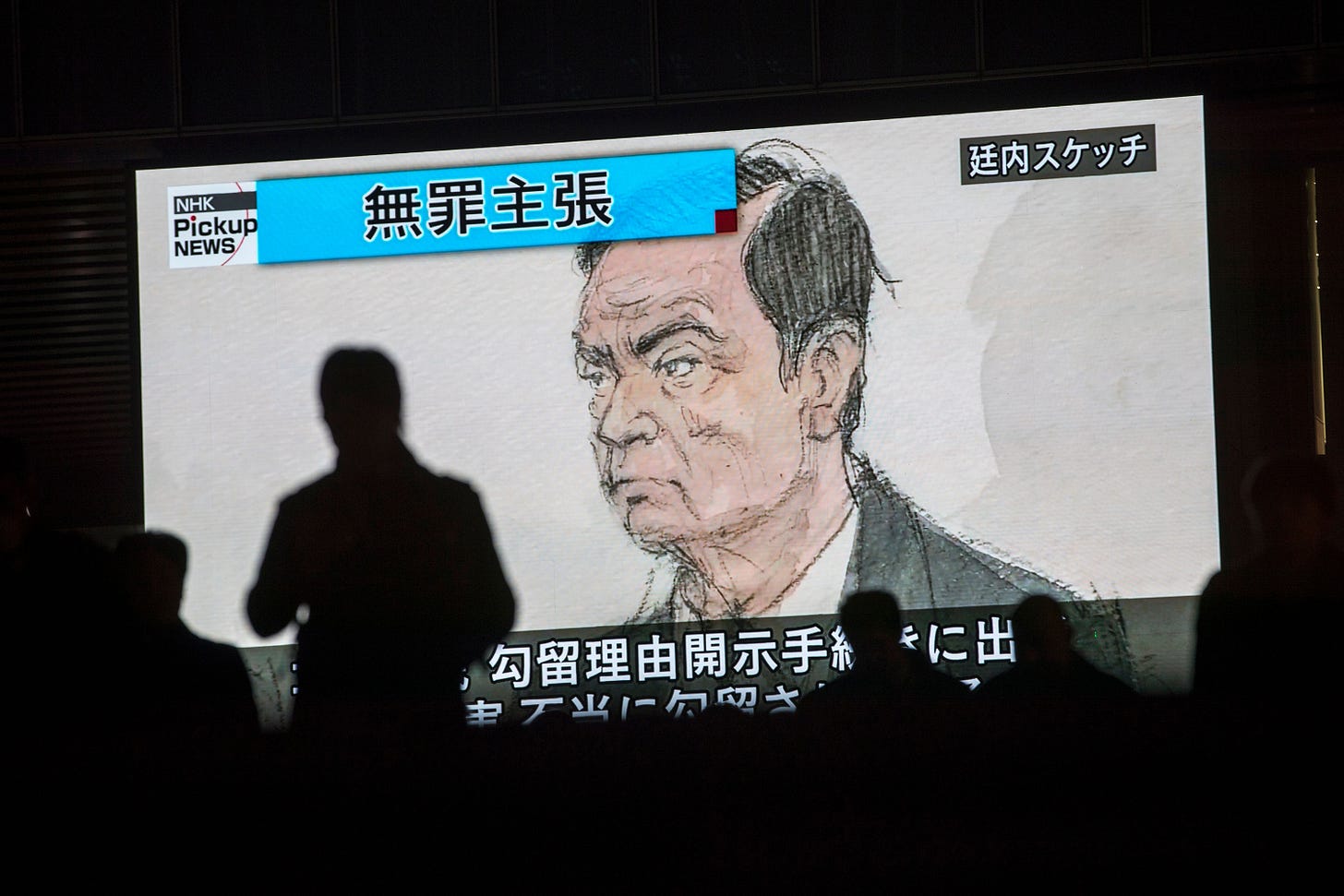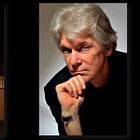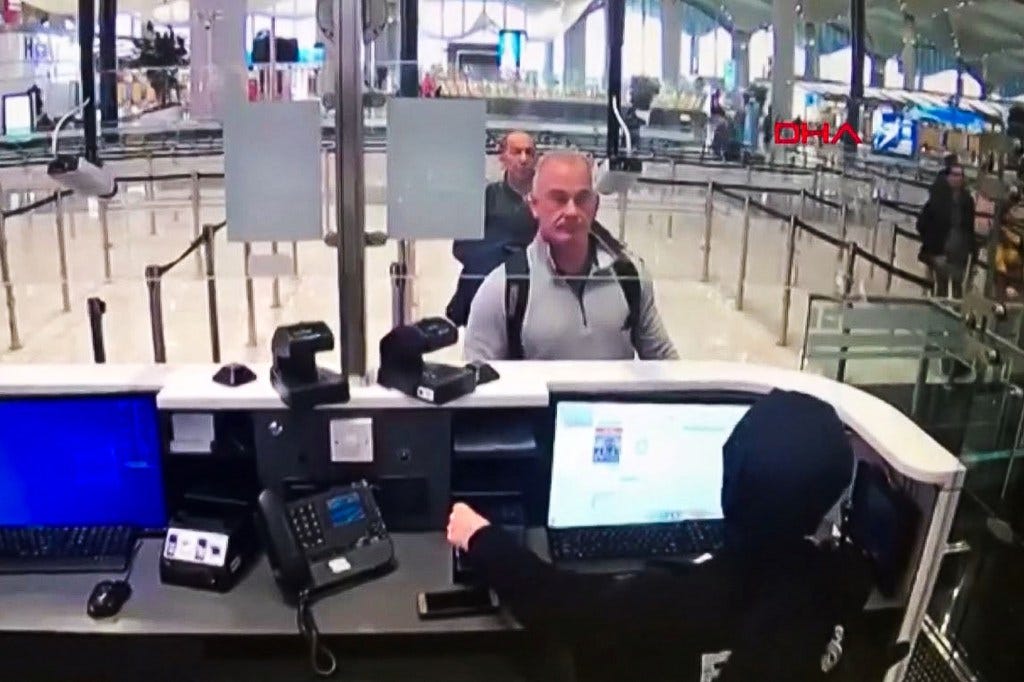Mike Taylor and the Audacious Carlos Ghosn Mission:Impossible-like Real Life Escape
And the questions I asked Mr. Taylor at the Foreign Correspondents' Club of Japan (FCCJ) press conference
Today I sat down to watch another live press conference hosted by the Foreign Correspondents' Club of Japan (FCCJ), always renowned for its commitment to thought-provoking discussions and fearless journalism. It was a great opportunity to engage with Mike Taylor, the mastermind behind the audacious escape from Japan of former CEO of Nissan and Renault, Carlos Ghosn. We got to listen to his extraordinary story and the systemic issues he sought to expose and I was happy that two of my questions to Mike were answered. Growing up watching action movies in the 1980’s, this story is straight out of Hollywood and will indeed soon become a feature film, with Sam Rockwell set to play Mike Taylor. My questions can be seen (read out by the speaker) in a YouTube clip later on down, but first let me explain who the players are, what actually happened, and why this is such a fascinating story.
Who is Carlos Ghosn?
Carlos Ghosn’s rise to fame in the automotive industry is legendary. Born in Brazil with French and Lebanese citizenships, he was long regarded as one of the titans of the global auto industry and hailed as a savior of struggling car manufacturers. As CEO of Nissan, he spearheaded a turnaround, pulling the company back from the brink of bankruptcy with bold reforms and cost-cutting strategies. Indeed, he was nicknamed “Le Cost Killer” for closing factories and laying off employees. His leadership extended to the Renault-Nissan-Mitsubishi Alliance, making him the first individual to simultaneously lead two Fortune 500 companies.
However, Ghosn's career took a dramatic turn in 2018 when he was arrested in Tokyo. Accused of financial misconduct, including underreporting income and misusing corporate assets, he faced Japan's rigorous legal system. Ghosn maintained his innocence, alleging a corporate coup by Nissan executives resistant to his plans for closer integration with Renault. To read more about Ghosn’s story in detail, Robert Whiting’s book "Gamblers, Fraudsters, Dreamers & Spies: The Outsiders Who Shaped Modern Japan" is an absolute must read. Here is my review of the fabulous book.
Bob is also writing a book about Greg Kelly, Mr Ghosn's former colleague at Nissan who was also under house arrest in Tokyo over allegations he helped his former boss disguise his earnings. Mr Kelly denies the charges.
The Carlos Ghosn story took an even more sensational twist in late 2019 when Ghosn staged a daring escape from Japan. Smuggled out in a cargo box, he fled to Lebanon, which does not have an extradition treaty with Japan. From there, Ghosn launched a public defense, claiming he was the victim of a conspiracy.

Today, Carlos Ghosn remains in Lebanon, a symbol of corporate triumph and controversy, leaving behind unresolved legal battles and a fractured auto alliance. His story raises questions about justice, corporate politics, and the price of global leadership. Nissan's business situation has worsened as well, with media reports suggesting the company could be heading toward bankruptcy. Nissan has faced significant financial challenges in 2024, marked by a substantial decline in both revenue and profits. In the first half of the fiscal year, the company reported a 1.3% decrease in net revenue, totaling 5.98 trillion yen (approximately $39 billion), down from 6.06 trillion yen in the same period the previous year.
Who is Mike Taylor?
Mike Taylor is a man whose life reads like a real life spy novel. A decorated former member of the U.S. Army Green Berets, Taylor has decades of experience in elite military operations and private security. After leaving the military, he founded American International Security Corporation which dissolved in 2014. He was also one of three individuals (and a corporation) accused of fraud and bribery in the procurement of a military contract for services in Afghanistan. Taylor’s expertise made him the perfect candidate to pull off Ghosn’s improbable escape and his background in navigating dangerous and complex situations would prove invaluable in orchestrating this high-profile mission. It’s truly a real life Mission: Impossible story.

A Mission:Impossible
Carlos Ghosn felt the full wrath of Japan's legal system in 2018. Accused of financial misconduct, he was arrested and subjected to conditions that many critics argue reflected a system designed to pressure confessions rather than ensure justice. With a 99% conviction rate in Japan’s courts, Ghosn felt trapped in a system where the odds were stacked against him.
Enter Green Beret Mike Taylor. Working with his son, Peter, and a small team, Taylor meticulously planned Ghosn’s escape. He disguised himself easy enough to slip unnoticed through the streets of Tokyo, boarded a bullet train to Tokyo, and then hid in a large box intended for musical equipment before being smuggled out of Japan via private jet. The operation was executed with military precision, exploiting gaps in security and logistics that no one thought possible. It was brilliant and took months to plan.

The Plan
Taylor’s strategy was meticulously crafted to exploit weaknesses in Japan’s security and immigration systems. The plan revolved around misdirection, stealth, and the use of seemingly innocuous items to bypass scrutiny. Taylor and his team coordinated every detail, from disguises to private jet schedules, ensuring the operation’s success relied on timing and precision.
Key to the escape was the use of a large black box, typically used to transport musical equipment. This box, with a custom-built interior, had enough space to conceal Ghosn comfortably. Crucially, Japanese airport security did not require X-ray screening for large cargo items, a loophole that became the linchpin of the plan.
The Execution
On December 29, 2019, Ghosn left his Tokyo residence unnoticed, aided by a local accomplice who distracted his security detail. Disguised to avoid recognition, Ghosn rendezvoused with Taylor, with experience extracting hostages, and his team at a nearby hotel. Once they arrived in Osaka via bullet train, Ghosn was concealed inside the black box, which was carefully packed to appear like standard musical equipment. Taylor and his team then transported the box to a private jet terminal at Kansai International Airport in Osaka, bypassing traditional security measures due to the cargo’s classification.
Once at the airport, the team loaded the box onto a Bombardier Global Express private jet. The flight crew, in on the plan, ensured no suspicions were raised during boarding. With Ghosn securely hidden, the plane took off for Istanbul, Turkey, a pre-arranged transit point. Upon landing in Istanbul, Ghosn transferred to another private jet bound for Beirut, Lebanon, where he holds citizenship and cannot be extradited under Lebanese law. The entire operation, from leaving his Tokyo residence to arriving in Beirut, took less than 48 hours. Turkey has detained seven people, including four pilots, as part of probe into how he passed through the country.
Ghosn’s escape shocked the world and humiliated Japanese authorities. The seamless execution highlighted significant gaps in airport security and raised questions about how a high-profile figure could slip away so easily. Ghosn continues to live in exile and under armed protection in Beirut, with no clear end in sight. I am sure this isn’t the conclusion he had envisioned for this dramatic saga but it sure beats the ending of the script that the Japanese would have wanted written. Japan gives millions in aid to Lebanon and is likely to want Mr Ghosn returned at some point.
While Ghosn’s escape became a symbol of defiance against what he called “hostage justice,” Taylor and his son paid a steep price. Ghosn was able to live freely in Lebanon but Taylor and his son, Peter, were later arrested in the United States and extradited to Japan, where they faced trial and imprisonment.
Mike Taylor endured 17 months in solitary confinement under harrowing conditions. Denied bathing privileges for six and a half months and suffering frostbite, his experience highlighted the grim realities of Japan’s detention system. Fuchu Prison is a world of strict discipline, silence, and rigid schedules “housing 1,700 inmates, including 350 foreigners, this Tokyo facility enforces a tightly controlled environment where work, silence, and punishment shape daily life”.
Taylor’s allegations of torture, coupled with the system’s notorious treatment of suspects, have reignited debates over human rights and the role of international oversight. Japan’s prison system is constantly in the news for their brutal interrogation techniques and styles of punishment including beatings and confinement with leather belts and wrist guards, leaving prisoners unable to eat and barely able to breathe. This from the LA Times:
Japan has come under repeated international criticism for its harsh prison system. Amnesty International said in a report released late last year that prison guards, police officers and immigration officials have subjected foreigners in detention to violent punishment, sexual assault and racist behavior. The Japanese government rejected those charges as biased and unfair.
Despite the personal toll it took on him, Mike Taylor's involvement in the escape is a clear reflection of his resourcefulness and determination. Now free, Taylor is using his voice to expose the injustices he witnessed. Through public appearances and interviews, he seeks to draw attention to the flaws in Japan’s legal system, from its reliance on prolonged detentions to its opaque court proceedings. Taylor’s story also raises questions about the ethics of international extradition and the balance between justice and diplomacy.
As Taylor continues to share his story, his experience serves as a stark reminder of the costs of standing up to powerful systems and this story has left another indelible mark on how the world views Japan’s legal system.
The Ghosn escape will surely be remembered as one of the most daring and unconventional extractions in modern history. It combined military precision with the cleverness of a heist movie, ensuring Mike Taylor’s name will forever be linked to one of the boldest covert operations ever carried out. Here are my two questions I asked:
Here is the link to the full press conference by the Foreign Correspondent’s Club of Japan.
Rionne McAvoy is the director of the award-winning documentary The One's Left Behind: The Plight of Single Mothers in Japan, showcasing his dedication to addressing pressing social issues. A committed documentary filmmaker and professional wrestler, he explores critical themes with passion and insight. Additionally, he has a keen interest in post-World War II Japan, particularly the intricate connections between politicians and gangsters during that era. Known in the wrestling ring as Rionne Fujiwara, he brings the same determination and storytelling prowess from his wrestling persona to his filmmaking endeavors.






Did anyone ask him about his legal fees and whether Ghosn was helping out?